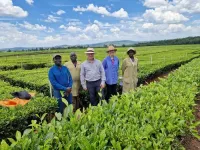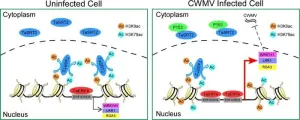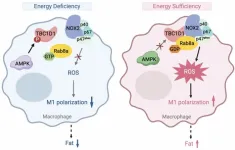(Press-News.org) By Leah Shaffer
Scientists are trying to understand how cannabis may affect long term neurodevelopment when people were exposed to it in the womb. Previous work by WashU researchers Sarah Paul and David Baranger in the Behavioral Research and Imaging Neurogenetics (BRAIN) lab led by Ryan Bogdan found associations between prenatal cannabis exposure and potential mental health conditions in childhood and adolescence, but potential biological mechanisms that could possibly explain this association were unclear.
In research published in Nature Mental Health this month, Bogdan, the Dean’s Distinguished Professor of Psychological & Brain Sciences at Washington University in St. Louis, and Postdoctoral Fellow Baranger, outline some of those potential mechanisms, the intermediate biological steps that could play into how prenatal cannabis exposure leads to behavioral issues down the line.
“We see evidence that cannabis exposure may influence the developing brain, consistent with associations with mental health,” said Baranger.
Trying to draw out the long-term impacts of cannabis exposure during pregnancy is not a simple knot to untangle. There are many confounding factors that affect mental health and behavior. For example, say someone was exposed to cannabis in utero and later develops attention deficit disorder as a teen---how do you differentiate that as an inherited trait, or a trait influenced by environmental factors, versus a trait that was influenced by cannabis exposure early in development? Or all three processes could contribute to eventual psychopathology. Another complication is the increasing prevalence of cannabis use, including among the pregnant population where cannabis use has increased from 3 to 7 percent from 2002 to 2017.
Researchers used statistical methods to filter out some of these confounding factors and to suggest potential biological measurements between prenatal cannabis exposure and types of adolescent behavior.
Nothing can 100 percent establish causation “but we can look at the plausibility of causation, and identifying potential biological correlates that are associated with cannabis exposure and these mental health outcomes suggests it’s plausible,” said Bogdan about the study results.
Researchers have been using data from the Adolescent Brain and Cognitive Development (ABCD) Study, an ongoing research project that includes nearly 12,000 children across the United States. As part of that study, researchers collected data about each mother’s substance use prior to the birth and neuroimaging data at ages 9-10 and 11-12. Some 370 children were exposed to cannabis prior to the mother’s knowledge of pregnancy, and 195 were exposed both before and after learning of pregnancy.
The researchers looked at a variety of neuroimaging measurements that are important in brain development, including measures of brain thickness and surface area, as well as measures of water diffusion in and out of cells. The patterns found in the group of children exposed to cannabis before birth are consistent with potential reductions in neuroinflammation.
“It’s possible what we’re seeing is an anti-inflammatory effect of cannabis which is leading to differences in how the brain is being pruned during neuro development,” said Bogdan.
Much has been touted about the anti-inflammatory effects of cannabis, but it’s not always good to reduce inflammation. It’s all about the timing. Too much of a reduction of inflammation at the wrong time could affect how the brain is pruned and primed.
Another theory is that cannabis exposure leads to accelerated aging. But don’t expect to find the smoking gun of biological clues pinning mental health conditions to early cannabis exposure.
It might not even be about pruning. It might also not be from the cannabis use itself, but rather the post combustion products from smoking cannabis that might set off accelerated aging and the downstream cognitive effects, said Bogdan.
Or, it’s all down to sociological factors.
Trying to find the one-to-one connection that proves that prenatal cannabis exposure has negative effects during the teenage years is a challenge and may not be possible with retrospective studies. Baranger notes that the major limitation of this data set is that it was retrospective; mothers reported what their cannabis use was 10 years ago, so he’s looking forward to new data from prospective, longitudinal studies that will offer more recent, accurate and detailed information about cannabis use in pregnancy.
“That will potentially give us more answers to these questions in the future.”
In the meantime, results from this study reaffirm that if you’re thinking about using cannabis while pregnant, “talk to your doctor about your choices and what other options there might be,” said Baranger.
Baranger DA, Miller AP, Gorelik AJ, Paul SE, Hatoum AS, Johnson EC, Colbert SM, Smyser CD, Rogers CE, Bijsterbosch JD, Agrawal A, Bogdan R. Prenatal cannabis exposure is associated with localized brain differences that partially mediate associations with increased adolescent psychopathology. Nat. Mental Health (2024). https://doi.org/10.1038/s44220-024-00281-7
Research reported in this press release was supported by R01DA54750 (RB, AA). Additional funding included: DAAB (K99AA030808), APM (T32DA015035), AJG (DGE-213989), SEP (F31AA029934), ASH (K01AA030083), ECJ (K01DA051759; BBRF Young Investigator Grant 29571), CER (R01DA046224), AA (R01DA54750), RB (R01DA54750, R21AA027827, U01DA055367). Data for this study were provided by the Adolescent Brain Cognitive Development (ABCD) study which was funded by awards U01DA041022, U01DA041025, U01DA041028, U01DA041048, U01DA041089, U01DA041093, U01DA041106, U01DA041117, U01DA041120, U01DA041134, U01DA041148, U01DA041156, U01DA041174, U24DA041123, and U24DA041147 from the NIH and additional federal partners (https://abcdstudy.org/federal-partners.html). The content is solely the responsibility of the authors and does not necessarily represent the official views of the National Institutes of Health.
END
Researchers find biological clues to mental health impacts of prenatal cannabis exposure
2024-07-05
ELSE PRESS RELEASES FROM THIS DATE:
Self-driving technology: improving safety through sound
2024-07-05
Calyo, Benedex Robotics and Cranfield University have joined forces to improve safety in self-driving vehicles.
The new partnership, part of the DRIVEN BY SOUND project led by Calyo, will develop a functional safety sensing platform based on 3D ultrasound, capable of operating effectively in even the most challenging environmental conditions.
The new technology allows autonomous vehicles to detect their surroundings in 3D in real time. It complements existing sensing and safety detection systems, providing an additional layer of ...
Cranfield and LIPTON Teas and Infusions begin advanced climate change mitigation and resilience field trials
2024-07-05
The project, supported by the Biotechnology and Biological Sciences Research Council (BBSRC) and UK Tea & Infusions Association (UKTIA), aims to improve tea production standards and create data and resources that can benefit the whole industry. The project is co-led and managed by Dr Helen Saini, Head of R&D Sustainable Agriculture at LIPTON Teas and Infusions, and Andrew Thompson, Professor of Molecular Plant Science and Head of Soil, Agrifood and Biosciences at Cranfield University.
Tea has the second lowest carbon footprint after tap water but about a quarter of its total greenhouse gas emissions are attributed to fertiliser use. In addition, climate change ...
Engage in strategic discussions at Targeting EVs 2024: Program released with stimulating questions
2024-07-05
Malta, July 5, 2024 - The program for the highly anticipated world conference on Targeting Extracellular Vesicles (EVs) has been released. The event, organized by the World Mitochondria Society and the International Society of Microbiota, is scheduled to take place on October 17-18, 2024, at the Corinthia Palace in Malta.
Exploring Strategic Questions at Targeting EVs 2024
The Targeting EVs 2024 conference promises to explore the multifaceted roles of EVs, with a special focus on their interactions with mitochondria and microbiota.
The scientific ...
Smoking a key lifestyle factor linked to cognitive decline among older adults
2024-07-05
Smoking may be among the most important lifestyle factors affecting how quickly our cognitive skills decline as we age, suggests a new study led by UCL researchers.
The study, published in Nature Communications, analysed data from 32,000 adults aged 50 or over from 14 European countries who responded to surveys over 10 years.
The researchers investigated how rates of cognitive decline might differ among cognitively-healthy older adults with different combinations of health-related behaviours, including smoking, ...
Current strategies ineffective in controlling Salmonella Dublin in Danish cattle
2024-07-05
Limited impact of current movement restrictions highlights need for enhanced strategies, says study.
In a recent study published in the Journal of Dairy Science, researchers from the Complexity Science Hub (CSH), the University of Copenhagen, and SEGES have shown that despite stringent movement restrictions among Danish cattle farms Salmonella Dublin continues to propagate, indicating that current strategies are insufficient to curb the spread of the disease.
"We analyzed 11 years of data, including detailed information about ...
Military service's hidden health toll: servicewomen and their families endure increased chronic pain
2024-07-05
A new study led by investigators from Brigham and Women’s Hospital reveals that military women and female family members face significantly higher risks of chronic pain
Active-duty servicewomen who served during periods of heightened combat deployments (2006-2013) face a significantly heightened risk of chronic pain compared to those serving at other times, according to a new study from researchers at Brigham and Women’s Hospital, a founding member of the Mass General Brigham healthcare system. The study also found that female dependents of military personnel serving ...
Glucagon-like peptide 1 receptor agonists and 13 obesity-associated cancers in patients with type 2 diabetes
2024-07-05
About The Study: Glucagon-like peptide receptor agonists (GLP-1RAs) were associated with lower risks of specific types of obesity-associated cancers compared with insulins or metformin in patients with type 2 diabetes in this study. These findings provide preliminary evidence of the potential benefit of GLP-1RAs for cancer prevention in high-risk populations and support further preclinical and clinical studies for the prevention of certain obesity-associated cancers.
Corresponding Authors: To contact the corresponding authors, email Nathan A. Berger, M.D. (nab@case.edu) and Rong Xu, Ph.D. (rxx@case.edu).
To access the embargoed ...
Medicare eligibility and changes in coverage, access to care, and health by sexual orientation and gender identity
2024-07-05
About The Study: The findings of this cross-sectional study indicate that Medicare eligibility was not associated with consistently greater improvements in health insurance coverage and access to care among LGBTQI+ individuals compared with heterosexual and/or cisgender individuals. However, among sexual minority individuals, Medicare may be associated with closing gaps in self-reported health status, and among states with the highest disparities, it may improve health insurance coverage, access to care, and self-reported health status.
Corresponding Author: To contact ...
TaSRT2 recognizes a viral protein to activate host immunity by increasing histone acetylation
2024-07-05
This study is led by Dr.Jian Yang and Dr. Kaili Zhong (State Key Laboratory for Managing Biotic and Chemical Threats to the Quality and Safety of Agro-products, Ningbo University). Their findings reveal a strategy that plants use to protect themselves from viral infection by regulating deacetylase function.
In this work, the team found CWMV infection induced H3K9ac and H3K79ac in wheat. Histone deacetylase TaSRT2 is demonstrated to deacetylate H3K9ac and H3K79ac since the levels of H3K9ac and H3K79ac were significantly reduced in TaSRT2 transgenic lines L6 and L8 plants but increased in virus-induced TaSRT2-silenced ...
TBC1D1 is an energy-responsive polarization regulator of macrophages via governing ROS production in obesity
2024-07-05
This study is led by Dr. Shuai Chen (Model Animal Research Center, School of Medicine, Nanjing University, China) and Dr. Hong-Yu Wang (Model Animal Research Center, School of Medicine, Nanjing University, China).
Metabolic and immune pathways are highly regulated and interwoven by multiple mechanisms to govern metabolic health. Dysregulation of these pathways underlies the development of metabolic diseases such as obesity and type 2 diabetes (T2D), which have become prevalent worldwide in recent years. Thus far, the molecular mechanisms ...





